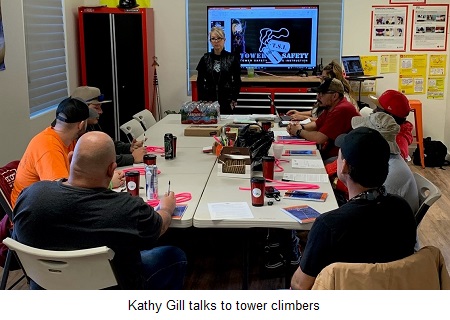If there’s one thing this crisis is teaching us, it’s how fragile our economy can be when the health of workers and their families are impacted. Even the recession-proof, weather-be-damned, full speed ahead wireless infrastructure industry has to take a moment to stop and listen to how crews are personally impacted by the pandemic, and how that can affect the bottom line. Last week Kathy Gill, CEO of Tower Safety and Instruction talked to a cross-section of climbers at her training center in Phoenix.
“These climbers are working everyday to assure our network stays available to the end user,” Gill told Inside Towers, “and now they’re experiencing a new crisis. The stress and limitations of being away at a job site in this environment for any length of time are becoming untenable,” she said. “The necessity to help protect the tower climbers and provide them with support for being on the road away from their families has never been more critical than now. The average climber works 60 to 70 hours a week in addition to the minimum 20 hours of drive time between sites.”
Gill’s focus group stressed how tough it is today to meet the rudimentary life requirements that were unthought of as recently as three weeks ago. Housing overnight workers is not just a problem but often an impossibility. One worker said an extended stay hotel turned him away because they may need to convert the rooms into emergency medical care units. If you do get a room, another said, don’t expect cleaning services or anyone behind the front desk.
The simple act of eating is now a logistical nightmare on the road, according to the panel. With restaurants and some grocery stores closed down or in limited supply, crews are dependent on fast food chains, though sparse and non-existant in rural areas. But those establishments, as well, are facing their own crew shortages, reduced hours and limited menus. And, always, is the food being prepared and handled safely? Picking up a case of bottled water for the site is no longer an option and bringing in your own cooler of potable water for the crew risks triggering OSHA infractions, the panel noted.
“The stress at home is another huge factor with these crews,” Gill said. “They want to be with their families because they are facing an existential crisis as well.”
One participant said the big tower guys and the carriers better get together soon to figure out how they are going to accommodate crews on the road. “They need us, pure and simple,” one crew member said “and a per diem doesn’t cut it when I have a family to take care of.”
“Is there something the carriers and tower owners can do to assist with food and lodging for these men and women?” Gill asked. “I’ve yet to hear any solutions being offered.”
By Jim Fryer, Inside Towers, Managing Editor





Reader Interactions